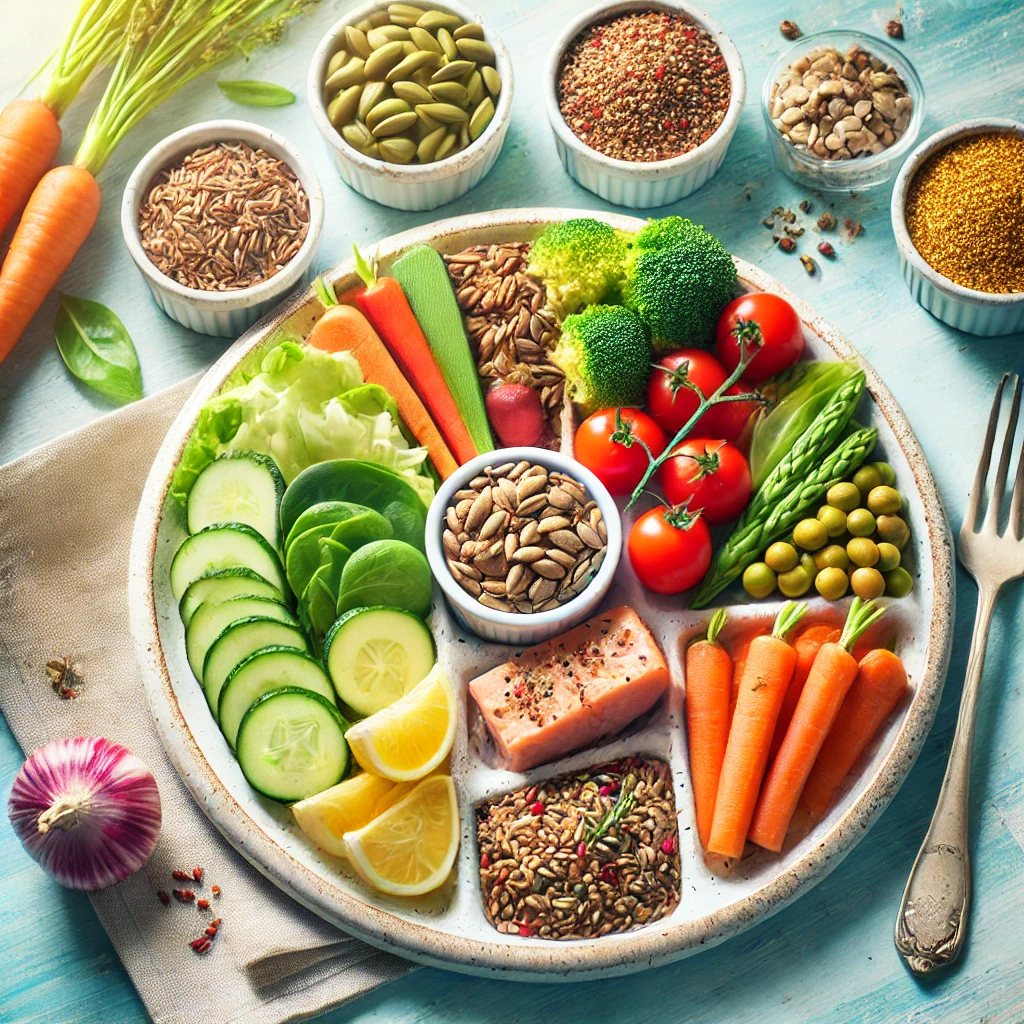Introduction
Losing weight doesn’t have to mean extreme diets or feeling constantly hungry. In fact, restrictive eating can backfire, leading to cravings, binge eating, and a slower metabolism. The key to sustainable weight loss is making smart food choices that keep you full, energized, and satisfied while still achieving your health goals. In this guide, we’ll explore practical healthy eating hacks to help you lose weight without starving yourself.

1. Focus on Nutrient-Dense Foods
Nutrient-dense foods provide maximum nutrition with fewer calories, keeping you full longer without excess calories.
Examples:
- Leafy greens (spinach, kale, arugula)
- Lean proteins (chicken, tofu, fish, beans)
- Healthy fats (avocados, nuts, olive oil)
- High-fiber foods (quinoa, lentils, whole grains)
By focusing on these foods, you can eat larger portions without consuming excessive calories.
2. Prioritize Protein at Every Meal
Protein is essential for building muscle, boosting metabolism, and keeping you full longer.
Best Sources of Protein:
- Eggs and egg whites
- Greek yogurt
- Chicken and turkey
- Lentils and beans
- Protein shakes
A high-protein breakfast can help reduce hunger throughout the day and prevent overeating later.
3. Eat High-Fiber Foods
Fiber slows digestion, helping you stay full for longer and reducing unnecessary snacking.
Fiber-Rich Foods:
- Oatmeal
- Chia seeds and flaxseeds
- Vegetables like broccoli and carrots
- Whole grains like brown rice and whole wheat bread
- Berries (blueberries, raspberries, blackberries)
Aim to incorporate at least 25-30 grams of fiber into your daily diet.
4. Drink More Water
Dehydration can sometimes be mistaken for hunger. Drinking enough water can help curb cravings and improve digestion.
Hydration Tips:
- Start your day with a glass of water.
- Carry a reusable water bottle.
- Drink herbal teas and infused water for variety.
- Have a glass of water before meals to prevent overeating.
5. Plan Balanced Meals
A balanced meal includes protein, fiber, and healthy fats to keep you full and satisfied.
Example Balanced Meal:
- Breakfast: Scrambled eggs with whole wheat toast and avocado
- Lunch: Grilled chicken salad with olive oil dressing
- Dinner: Salmon with quinoa and steamed vegetables
- Snacks: Almonds, hummus with veggies, or Greek yogurt with fruit
Planning meals ahead of time can help prevent impulsive, unhealthy choices.
6. Use Smaller Plates and Bowls
Portion control is key to managing calorie intake. Using smaller plates tricks your brain into thinking you’re eating more than you actually are.
Tips for Portion Control:
- Serve meals on smaller dishes.
- Avoid eating directly from large containers.
- Listen to hunger and fullness cues rather than eating out of habit.
7. Slow Down and Practice Mindful Eating
Eating too quickly can lead to overeating since your brain needs time to register fullness.
How to Eat Mindfully:
- Chew food thoroughly before swallowing.
- Avoid distractions like TV or smartphones while eating.
- Take breaks between bites.
- Pay attention to how full you feel and stop eating before you feel stuffed.
8. Healthy Snacking to Curb Cravings
Instead of skipping snacks, choose nutrient-rich options that keep you satisfied between meals.
Healthy Snack Ideas:
- Apple slices with peanut butter
- Cottage cheese with berries
- Carrot sticks with hummus
- Hard-boiled eggs
- Dark chocolate and almonds
Smart snacking prevents excessive hunger and binge eating later.
9. Reduce Added Sugar Intake
Excess sugar can lead to weight gain and cravings. Reducing added sugar can help with weight loss while improving overall health.
Ways to Cut Sugar:
- Choose unsweetened beverages.
- Read ingredient labels for hidden sugars.
- Swap soda for sparkling water with lemon.
- Use natural sweeteners like honey or stevia in moderation.
10. Get Enough Sleep
Poor sleep can lead to increased cravings and slower metabolism, making weight loss harder.
Sleep Tips for Weight Loss:
- Aim for 7-9 hours of quality sleep.
- Avoid caffeine late in the day.
- Establish a bedtime routine to signal your body it’s time to rest.
- Keep electronic devices away before bed.

Conclusion
Losing weight doesn’t require extreme dieting or constant hunger. By making small, sustainable changes to your diet and eating habits, you can achieve long-term weight loss while feeling satisfied and energized. Focus on whole foods, eat mindfully, stay hydrated, and balance your meals to create a healthy lifestyle that works for you.
At GoodForGirlz, we encourage women to embrace healthy eating habits in a way that is enjoyable and sustainable. Start applying these healthy eating hacks today and see the difference in your journey toward a healthier you!





